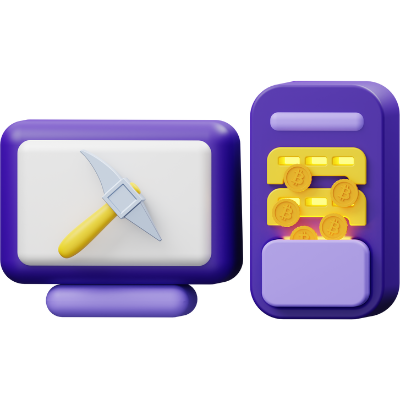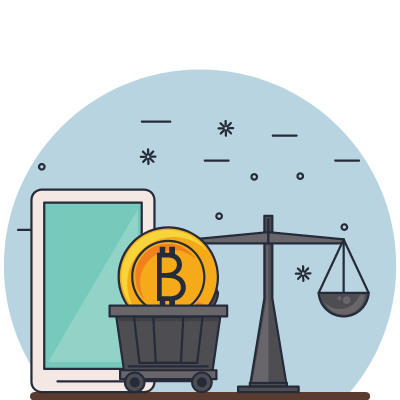
As the price of Bitcoin continues to seesaw between bullish and bearish candlestick patterns, those who can’t afford to buy the currency may continue to wonder: How long does it take to mine 1 Bitcoin? If you are one of these people, then we have good news for you because we will try to answer this question in this article.
First of all, we must consider that BTC mining is no longer what it used to be ten years ago when anyone with a PC could mine Bitcoin. However, nowadays, it is almost impossible to mine Bitcoin because of a number of factors. To get a clear view of why things have changed, let’s start by analyzing the process of mining.
The Process of Mining a Block
Unlike earlier days, nowadays, the process of mining Bitcoin is best contextualized in terms of mining cryptocurrency blocks, as opposed to single units, such as one Bitcoin (BTC). The reason is simple: new Bitcoins are only mined whenever a new block on the Bitcoin blockchain is validated.
Block mining requires solving complex mathematical equations, which are also known as a hash. The first miner to validate new block benefits by getting a reward – which is currently 6.25 BTC, down from 12.5 BTC.
Mining Speed
It’s not easy to determine how long does it take to mine 1 Bitcoin because it depends on several factors. Notably, computational power, competition, and the hardware used are great determinants. Nonetheless, the consistent factor that determines how long it takes to mine 1 BTC is the hashing difficulty algorithm. It is designed in a way that ensures it self-adjusts to yield a block verification time of 10 minutes.
Therefore, in an ideal situation, it takes around 10 minutes to mine BTC. However, most mining conditions and environments are far from ideal. For example, while it was possible to mine BTC alone using your personal computer, things have now changed because of recent technological developments.
Mining now requires a lot of electricity and hardware that is far beyond most of us. This ultimately affects your mining speed. So, if you are mining solo, then your mining duration will likely be more than the ideal 10 minutes.
The Role of Mining Hardware and Competition
As already mentioned, operating a solo mining enterprise may not only be expensive but also time-consuming. The best approach to Bitcoin mining is to use a mining pool. Any mining pool that adopts the latest hardware has the highest chance of being the first to mine a block of BTC within the ideal time frame of 10 minutes.
Also, new mining rigs with higher performance and computing abilities can greatly expedite the process of mining Bitcoin. As a result, they are making it difficult for solo miners to match the competition. The notable mining rigs are CPU, GPU, FPGA, and ASIC.
CPUs are easy to install and configure. However, for enhanced performance, you have to get multi-core processors or CPUs with several motherboards. CPUs were initially used for Bitcoin mining, but the emergence of GPU, FPGA, and ASIC relegated them to mining certain altcoins. Subsequently, even the GPU and FPGA have also become irrelevant in mining Bitcoin because of advancements in technology.
Currently, miners use ASIC hardware devices for mining Bitcoin. These chips are specifically tailored to mine BTC based on Bitcoin’s SHA-256 hashing algorithm. Therefore, using any other less optimized hardware will make it very difficult to compete with mining pools that use the ASIC technology.
How Long Does It Take to Mine 1 Bitcoin Using a PC?
The average time for generating one Bitcoin is about 10 minutes, but this applies only to powerful machines. The speed of mining depends on the type of Bitcoin mining hardware you are using. If you are using your home computer to mine Bitcoin with the computing requirements of today, it could take years to mine one single block because there are many powerful ASICs already mining on the network.
Also, new mining rigs are created and launched almost yearly, with higher performance and computing abilities. Therefore, with the entry of ASICs and advanced mining rigs, using the conventional PC, whether you use Windows or MacOS, you will yield very little in mining. You simply can’t match the capacity of ASICs.

However, not all is lost. You have the alternative of joining a Bitcoin mining pool. While the generation time of a Bitcoin might be less than mining on your own, you still rely on the computational power of the other members of your pool. Therefore, it’s rather difficult to precisely answer: “How long does it take to mine 1 Bitcoin question?” It depends on the pool you choose and whether it will be the first to validate the transactions on the blockchain.
So, is joining a mining pool the best alternative? Sure! The reason why mining is so competitive is that the first miner to solve the computational issues correctly gets the block reward. In order to solve the hash, you need a considerable amount of computing power, which you cannot produce by using just personal computers. However, you can still accumulate fractions of Bitcoins if you join a group of miners and combine mining power to form a mining pool and then share the block rewards.
How Long Does It Take to Mine 1 Bitcoin Using a Smartphone?
Even if you have decided to mine Bitcoin solo on your smartphone, you will find the process quite difficult. Apart from the huge amount of processing power required to mine the coin, Apple and Google have restricted on-device mining on iOS and Android. In fact, the latest Developer Program Policy shared by Google is very categorical on cryptocurrency mining. It read: “We don’t allow apps that mine cryptocurrency on devices. We permit apps that remotely manage the mining of cryptocurrency.”

Clearly, from the policy, Google only permits apps that enable remote monitoring of the mining process. So, what made Google ban the crypto mining apps? Or rather, why did Apple ban the crypto-mining apps from their store?
While Google doesn’t explicitly explain the reasons behind the ban, Apple is very clear that “Apps should not rapidly drain battery, generate excessive heat, or put unnecessary strain on device resources.” Deductively, this is the same reason that caused Google to ban these apps from their store.
Of course, if you’ve been looking for mining apps on Play Store, you will find some of them. Notably, you will find MinerGate Control, which doesn’t really mine cryptocurrency, but only helps you to manage the process remotely.
If you decide to be crafty, you can download mining apps from the web. Although this is possible, the repercussions can be very debilitating, as you risk infecting your smartphone with malware. Now you have the answer at: “How long does it take to mine 1 Bitcoin?”
Cloud Mining on Your Smartphone
Although MinerGate initially supported cloud mining via its data center, lately, the team no longer supports the BTC mining pool. MinerGate’s website reads: “Due to the ongoing trend of reduced profitability of Bitcoin mining, MinerGate’s team has decided to cease support of the BTC mining pool.”
How Long Does It Take to Mine 1 Bitcoin – Conclusion
As Bitcoin mining becomes very competitive and less lucrative, no miner has the guarantee that he will be the one to receive the block, especially if he lacks the computational resources required to outperform the other miners. Therefore, calculating the reward time for successfully mining a block is complex, and even with all the factors, there is no easy, precise way of answering the question of how long does it take to mine 1 Bitcoin? The answer even gets convoluted if you are using a PC or smartphone when your competitors are using ASICs and mining rigs.
Notice: The information in this article and the links provided are for general information purposes only and should not constitute any financial or investment advice. We advise you to do your own research or consult a professional before making financial decisions. Please acknowledge that we are not responsible for any loss caused by any information present on this website.
Source: https://coindoo.com/how-long-does-it-take-to-mine-1-bitcoin/